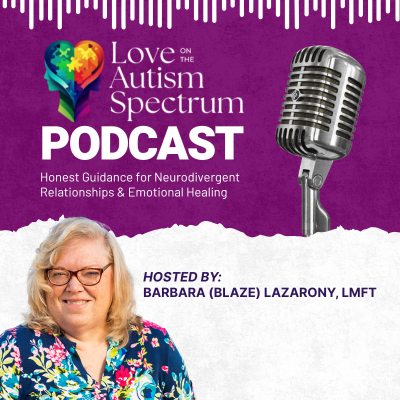Every marriage has its challenges, but when one or both partners are neurodivergent, the relationship can carry a different kind of complexity. Not harder. Just different. And sometimes, that difference gets pathologized, misunderstood, or minimized—especially when Autism Spectrum Disorder (ASD) is part of the equation.
For neurodiverse couples, love and connection aren’t about “fixing” communication or masking traits. They’re about learning how to listen, co-regulate, and meet each other with curiosity instead of judgment. A neurodiverse marriage brings its own set of dynamics, where unique behaviors, communication styles, and emotional reciprocity can create both challenges and opportunities for growth.
In this blog post, we’ll explore what makes neurodiverse relationships unique, the common challenges couples face, and strategies to move from surviving to thriving—even when things feel confusing, exhausting, or stuck.
3 Key Takeaways
- Autism affects relationships in distinct ways—particularly in communication, emotional regulation, and sensory needs—but these challenges can be navigated with clarity and intention.
- Understanding, not pathologizing, ASD behaviors is key. Many conflicts stem not from a lack of love, but a mismatch in processing, pacing, or nervous system needs.
- With the right support—therapy, communication tools, and psychoeducation—neurodiverse couples can build deeply meaningful, sustainable relationships rooted in mutual care and self-awareness.
Understanding Autism in the Context of Marriage
Let’s begin with clarity. Autism Spectrum Disorder (ASD) is not a mental illness. It’s a neurodevelopmental difference—a way of processing, sensing, thinking, and relating that’s wired differently from the neurotypical majority. And while no two autistic individuals are alike, timely diagnosis is important for understanding relationship dynamics and accessing appropriate support. Some common traits do show up in relationship dynamics.
Core ASD Traits That Show Up in Marriage
- Literal interpretation of language: This can impact humor, sarcasm, or emotionally nuanced conversations.
- Sensory sensitivities: Sound, light, touch, smell—every sensory channel can be heightened (or dulled), affecting everything from date night to daily routines.
- Difficulty with emotional reciprocity: It’s not that autistic individuals don’t feel deeply; it’s that expressing and recognizing emotional cues can be harder. Challenges with social skills and mind blindness—difficulty understanding others’ emotions and perspectives—can lead to misunderstandings and make emotional connections in marriage more complex.
- Need for routine and predictability: Changes in schedule or spontaneous plans may cause overwhelm, not resistance.
- Focused interests: A partner may seem “tuned out” if deeply immersed in a special interest, even when they still care deeply.
None of these traits is inherently problematic. But they do require awareness—and compassion—from both partners to navigate successfully.
What Makes Autism Marriage Problems so Challenging?
When couples struggle, it’s often not because one partner is autistic—it’s because no one ever gave them a roadmap for what neurodiverse love really looks like. Neurodiverse marriages come with unique difficulties and expectations, which can deeply affect emotional connection and daily life.
Over time, couples learn to cope with these challenges, finding ways to adapt and support one another.
Mismatched Communication Styles
One partner might want a deep emotional conversation, while the other prefers practical problem-solving or quiet time. One might express love through words and affection, while the other expresses it through acts of service or shared routines. Often, talking styles differ—one partner may value open talking about feelings, while the other finds such conversations challenging. When meaningful talking is missing, couples can feel disconnected and misunderstood.
This mismatch can easily lead to misattunement:
- “He never tells me how he feels.”
- “She keeps asking questions I don’t know how to answer.”
- “I’m exhausted from always having to explain everything.”
- “It feels like we haven’t really talked in ages.”
Sound familiar? You’re not alone.
Emotional Labor & Misunderstood Shutdowns
Often, the neurotypical partner (commonly the woman in heterosexual relationships) becomes the emotional manager—navigating social calendars, soothing meltdowns, initiating intimacy, and making sense of disconnects. Many wives, especially neurotypical wives, experience these challenges firsthand. Over time, this can lead to feelings of resentment, burnout, and a profound sense of loneliness.
Meanwhile, the autistic partner may feel like they’re constantly failing despite their best efforts. They may shut down, not out of disinterest, but as a nervous system survival response, and both spouses are affected by these dynamics.
The Invisible Work of Translation
Many neurodiverse couples are engaged in a constant, unspoken act of translation. Not just of language, but of cues, needs, and expectations. When basic skills like perspective-taking or communication are lacking, this translation becomes even more challenging. Special interests can also be misunderstood, necessitating additional communication between partners to prevent conflict or resentment. Without awareness and tools, this can wear a relationship thin.
Conflict Isn’t the Problem—Misunderstood Needs Are
Let’s reframe. Conflict doesn’t mean your relationship is broken. In fact, conflict can be a gateway to deeper connection—if both partners have the tools to navigate it. Developing strong conflict resolution skills is especially important in neurodiverse marriages, as it helps address misunderstandings and fosters mutual understanding.
In neurodiverse relationships, conflict often stems from:
- Sensory overwhelm
- Misinterpreted tone or facial expressions
- Differing needs for social time vs. solitude
- Unspoken assumptions or resentment build up
And here’s where things get hard: When these triggers occur repeatedly, one or both partners may begin to feel unseen, unsafe, or emotionally isolated, and repeated misunderstandings can cause unintentional harm, even when not intended.
What Helps: Core Strategies for Neurodiverse Couples
If you’re navigating these challenges, know this: You are not broken. Your relationship is not doomed. And there are tools that help.
1. Learn Each Other’s Nervous Systems
Start by getting curious, not critical. What sensory inputs flood your partner? What calms them? What activates you? Knowing each other’s nervous system profiles can help reduce shame and reframe behavior as adaptive, rather than offensive. Reading body language and nonverbal cues can be challenging, especially for individuals with autism, but it is important for mutual understanding.
2. Practice Direct, Literal Communication
Skip the guesswork. Be explicit. Say what you mean. Autistic partners often thrive when expectations are clear and direct. For some, interpreting social cues or body language can be difficult, so direct communication supports understanding and connection:
Instead of: “I wish you’d show more affection.” Try: “Could we hug before bed each night? It helps me feel close to you.”
And neurotypical partners—resist sarcasm, rhetorical questions, or indirect comments. Clear is kind.
3. Create Predictable Routines for Connection
Love doesn’t have to be spontaneous to be real. In fact, scheduled connection time—like a weekly check-in or date night—can create safety and intimacy. Prioritizing quality time together is essential for maintaining intimacy in neurodiverse marriages, helping to strengthen your relationship and foster emotional connection.
Example: A Sunday afternoon walk with 30 minutes of device-free conversation. Keep it low-pressure and repeatable.
4. Use Tools to Support Communication
Sometimes words aren’t enough. Try:
- Feelings wheels to help name emotions
- Visual schedules or whiteboards for shared plans
- Texting for difficult topics when face-to-face feels too intense
- Shared journals or voice notes to track thoughts and feelings over time
Choosing the right point in time to communicate can make difficult conversations more manageable and help ensure your message is received.
When the Neurotypical Partner Feels Alone: The Cassandra Experience
Many neurotypical partners—especially women—report something called the “Cassandra phenomenon”: a sense of being emotionally abandoned or gaslit by others who don’t see what’s happening at home.
They might hear:
- “He seems so nice!”
- “You’re being too sensitive.”
- “Are you sure this isn’t just a communication issue?”
This invalidation deepens their exhaustion. Chronic stress from these experiences can lead to panic attacks and ongoing traumatic stress disorder, as well as weaken the immune system and contribute to autoimmune disorders. They may struggle with anxiety, depression, or Complex PTSD symptoms.
If this is you, please know: You are not imagining things. Your pain is real. Support is available for you, too. Please reach out for a “Clarity & Connection” Zoom, I can help and support you!
Rebuilding Trust & Intimacy After Repeated Disconnects
Sometimes couples arrive in therapy years into shutdowns, misunderstandings, and misattunements. They’ve grown distant. Sex is infrequent. Conversations feel loaded. But they still care. Hope can be a driving force for couples seeking to rebuild their relationship.
Here’s where we start:
By taking these steps, couples show that their efforts matter and can lead to a more fulfilling life together.
Build a Shared Language
Couples need a common way to talk about their experience. That includes understanding neurodivergent traits, as well as the nervous system and the 8 F’s of trauma responses (fight/flight/freeze/fawn/faint/flock/fornicate/feed), and the core needs underneath each partner’s behavior.
Normalize Repair Over Perfection
You will mess up. That’s human. The goal isn’t perfection—it’s repair. Learn to say, “I missed that—I want to try again,” or “That didn’t land how I meant it. Can I try another way?”
Reconnect Through Co-Regulation
Intimacy often begins not with sex or conversation, but with nervous system safety. Holding hands. Listening to music. Cooking together. Shared eye contact. Begin with co-regulation and let the connection grow from there.
Therapy for Neurodiverse Couples: What Actually Works
Not all couples therapy is created equal. In fact, traditional models can backfire when therapists don’t understand ASD. Look for someone who:
- Understands neurodivergent processing, pacing, and language
- Won’t frame the autistic partner as “emotionally unavailable”
- Can hold space for both partners without blame
- Works with nervous system science, not just talk-based insight
It’s especially important that therapy addresses the unique needs of both partners, particularly when one spouse is on the autism spectrum, to ensure both feel seen and supported. Effective therapy can strengthen the marital relationship by fostering understanding and improving communication between partners.
In my work, I use a mix of Internal Family Systems (IFS), Emotionally Focused Therapy (EFT), and neurodivergent-affirming strategies to create safety and connection for both partners.
Real Stories: A Glimpse Inside Neurodiverse Love
Client Story (Anonymized): Many spouses face similar challenges when navigating relationships where one partner is autistic. Laura, a neurotypical teacher, came to me in tears. Her husband Alex, a person diagnosed with ASD at 43, often seemed “checked out.” As a married couple, Laura, his wife, noticed he missed emotional cues and didn’t respond to her stress with comfort, just facts.
In our work, Alex learned that “I’m overwhelmed” wasn’t a request for problem-solving, but for emotional presence. Laura learned that her husband did care deeply, but his way of showing it was folding her laundry and preloading her favorite podcasts.
Each person in the relationship brought unique strengths and challenges, which helped them grow together as spouses.
Over time, they built new rituals—daily hugs, weekly check-ins, and gentle touch. It wasn’t perfect. But it was enough. And it was theirs.
Parenting, Sensory Needs, and the Family System
If you’re raising children in a neurodiverse household, add another layer: fatigue, routines, sensory overload, and often, unspoken blame. Raising kids, especially when a child is born with autism, can deeply impact family life and relationships. Parents of two children or a son with autism may face unique challenges that require extra support and understanding. Prioritizing self-care and well-being is essential for parents and family members to manage stress and maintain healthy relationships. Families, friends, and extended family members can provide crucial support, offering respite and strengthening the support network. Dealing with children’s needs requires teamwork and support from the whole family.
Here’s what can help:
- Use tag-team parenting schedules to prevent burnout.
- Create quiet, sensory-friendly zones in your home.
- Build routines that reduce last-minute chaos.
- Let go of neurotypical parenting standards that don’t fit your family.
And remember: your children are watching how you treat each other. Modeling repair, self-advocacy, and co-regulation teaches them emotional safety more effectively than any lecture ever could.
When Is It Time to Seek Help for Autism Marriage Problems?
If you or your partner are experiencing:
- Ongoing resentment or burnout
- Sexual disconnection or shutdown
- Frequent miscommunication and shutdowns
- Emotional withdrawal or chronic tension
- Anxiety, depression, or trauma symptoms
… it’s time to reach out. High divorce rates among couples raising children on the autism spectrum highlight the importance of early intervention and support. Seeking help can reduce the risk of marriage breakdown and divorce, and you deserve support that honors your nervous systems, your histories, and your hopes for your relationship. I can help; this is my specialty. Book your “Clarity & Connection” Zoom to learn more today.
Summary: You’re Not Alone—And You’re Not Broken
Neurodiverse relationships aren’t about “overcoming” autism. They’re about honoring difference, reducing blame, and learning to connect in ways that actually work for both partners.
Most people face relationship challenges at some point in their lives, but neurodiverse couples may experience these challenges differently, often requiring unique approaches to connection and understanding.
Whether you’re the autistic partner, the neurotypical one, or both of you are on the spectrum, know this:
With clarity, compassion, and the right tools—your relationship can thrive.
You don’t have to keep surviving alone.
Let’s walk this path together.
FAQs
Is it hard to be in a relationship with someone with autism?
It can be—but not because of a lack of love. It’s often the unspoken mismatches in communication and nervous system needs that create stress. With support, autistic people make wonderful, loyal, and deeply thoughtful partners.
How can I tell if my partner is autistic?
Common signs include literal communication, sensory sensitivities, difficulty reading emotional cues, or intense focus on specific interests. An assessment with a trained professional can provide clarity and support.
How do marriage problems affect intimacy?
Intimacy may be impacted by sensory sensitivities, differences in emotional expression, or shutdowns under stress. However, with honest conversation and sensory-aware strategies, many neurodiverse couples can build rich, connected, and intimate lives.
What kind of therapist should we work with?
Seek a therapist who is neurodivergent-affirming and trained in ASD-specific couples work. Look for someone who understands nervous system regulation, and who won’t assume neurotypical norms are “right.”







